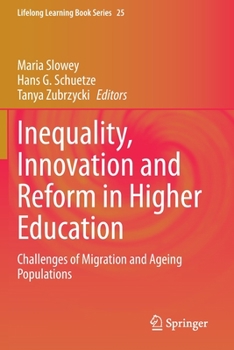Inequality, Innovation and Reform in Higher Education: Challenges of Migration and Ageing Populations
Select Format
Select Condition 
Book Overview
An important backdrop to the achievement of the Millennium Development Goals involves consideration of the impact of a 'new demographics' derived from the interaction of two global developments. First, high levels of internal and cross-border mass migration, stimulated by climate change, violence and disparities in wealth and social stability within and between different countries and the global South and North. Second, the phenomenon of increasing longevity and rapidly ageing populations, especially in the developed world.
This book explores the central role that socially engaged higher education might potentially play in helping address these challenges, enhancing lifelong learning opportunities and facilitating more positive outcomes for both individuals and societies. The contributors to this book are scholars of higher education and lifelong learning based in twelve countries from Europe (Germany, Ireland, Slovenia, Sweden and the United Kingdom), the Americas (Brazil, Canada, Mexico and the USA), Japan, Australia and New Zealand.
"This is an extremely timely and important collection focusing on growing migration
and an increase in ageing populations, two major social trends that researchers in higher
education often overlook. The multi-level analysis of the role that higher education can
play, together with the contributions from 12 countries in the North and South make
this one of the most outstanding collections on these themes."
Rajani Naidoo, Director, International Centre for HE Management, University of Bath.
"Auguste Comte famously observed that demography is destiny. This superb volume
examines the powerful impact of two global demographic trends, and the vital role
universities can play in responding to them. The book describes a range of innovative
and pragmatic responses, while deepening our understanding of why serving these
populations it so important for the health of our communities and our democracies."
Matthew Hartley, Professor and Associate Dean, GSE, University of Pennsylvania.
"The powerful synergy of the longevity revolution and the technology revolution
necessitates a corresponding education revolution. It is clear that the educational
assets acquired in youth and early adulthood no longer provide sufficient currency
for longer, big change impacted lives. This timely book examines the benefits of creating
an inclusive, rights-based culture of learning at every stage of life."
Alexandre Kalache, Co-President, International Longevity Centre (ILC) Global Alliance and ILC Brazil.
"How can we understand the current dynamics of migrations and demographic trends
to adapt HE access policies accordingly? By bringing together empirical research in
different countries, this book offers an essential insight on this very sensitive issue
for both individuals and their societies. A must read for researchers and policy makers."
Ga?le Goastellec, Professor of Sociology, University of Lausanne, Chair of the Consortium of Higher Education Researchers.
"The contributions cover an admirably wide range of countries, shedding different lights on these common themes. The book sets a challenging and informed agenda which policy-makers and institutional leaders would do well to take seriously."
Tom Schuller, Formerly Head of the Centre for Educational Research and Innovation, OECD.





